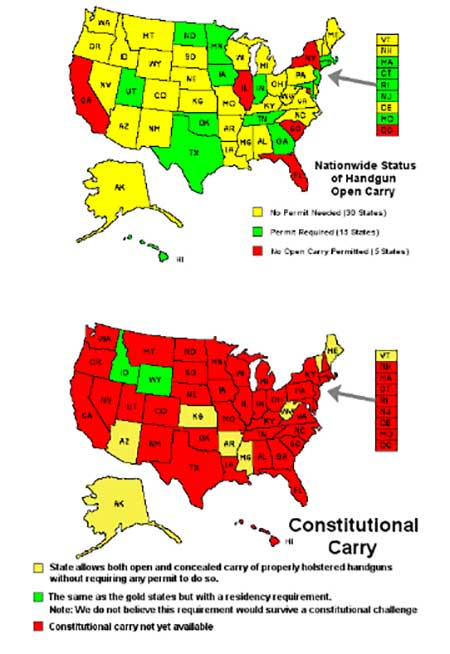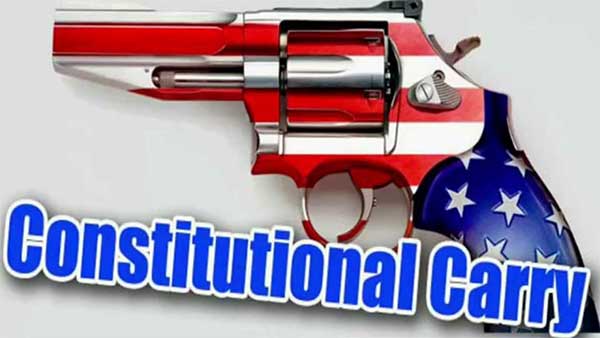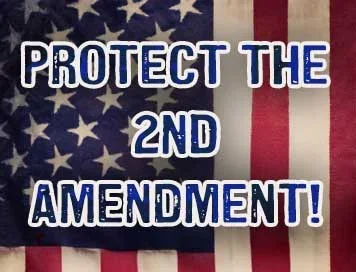

USA – -(Ammoland.com)- Congratulations President Trump, Vice-President Pence, and all
newly elected Congress Members, State Governors, and State Legislators.
The only clear cut campaign issue in this last national election cycle pertained to the right to bear arms. Most winning candidates across all parties openly supported the Second Amendment’s right to bear arms.
So Let’s be Clear – It’s Time to Get to Work on National Gun Rights Legislation!
OpenCarry.org Proposes 2-Pronged National Firearm Carry Enforcement Statute (NFCES)
NFCES will deploy Congress’ Power to Enforce Civil Rights under Section 5 of the Fourteenth Amendment to Enforce the Second Amendment’s Right to Openly “Possess and Carry Firearms in Case of Confrontation.”
NFCES shall Set Forth and Fund a Federal Concealed Handgun Carry Reciprocity Grant Program to provide an annual grant to all states, districts, and other federal possessions that accept all states’ concealed carry licenses just as the federal government has provided grants to states in exchange for state action enacting primary seat-belt enforcement laws.
From the view looking down OpenCarry.org’s gun sights, the only clear cut campaign issue in this last election cycle pertained to the right to bear arms at both state and federal levels.
And now it’s time for action.
In District of Columbia v. Heller (2008) the US Supreme Court affirmed the Court of Appeals for the District of Columbia Circuit, holding that the Second Amendment provides the right to “possess and carry weapons in case of confrontation.”
But at the same time, the Heller Court observed that “the majority of the 19th-century courts to consider the question held that prohibitions on carrying concealed weapons were lawful under the Second Amendment or state analogues,” while statutes forbidding open carry were suspect and often struck down as unconstitutional. [emphasis added].
“Open carry, therefore, is the right,” says Mike Stollenwerk, co-founder of OpenCarry.org, adding that “concealed carry is a privilege which can be banned or sharply regulated by the sovereign states.”
Currently a full thirty states generally allow the open carry of properly holstered handguns – typically at the age of 18 – without the need for licenses, but only a small (but growing) number of states allow unlicensed concealed carry.
While President Trump campaigned in support of a nation-wide concealed hand gun carry reciprocity law, no specifics have yet emerged, “so we thought we would provide some as food for thought and action,” said Virginia attorney John Pierce,” co-founder of OpenCarry.org and a member of the American Bar Association’s firearms law subcommittee who specializes in gun trusts, the restoration of federal and state rights to possess a firearm, and other matters.
“First, we need to deal constitutionally with state and other federal possessions’ violations of the right to openly “possess and carry weapons in case of confrontation.” But, second, at the same time, added Pierce,“we must also statutorily address the popular demand for interstate concealed handgun carry reciprocity.”
OpenCarry.org proposes a straight forward two-part conceptual framework to accomplish both goals through the National Firearm Carry Enforcement Statute (NFCES).

First, to quash unconstitutional state violations of the right to bear arms, NFCES will provide that Congress, pursuant to its Section 5 powers under the Fourteenth Amendment, forbids states from criminalizing the open possession and carry of firearms in case of confrontation on foot and in vehicles on public streets, alleys, thoroughfares, sidewalks, parks, and other similar public places.”
And second, NFCES will fund a federal concealed handgun carry reciprocity grant program to provide an annual grant to all states, districts, and other federal possessions that accept all states’ concealed carry licenses just as the federal government has provided grants to states in exchange for enacting primary seat-belt enforcement laws.
Carry on!
- John Pierce, BS, MBA, JD, co-founder, OpenCarry.org,
- Mike Stollenwerk, BS, MBA, MMAS, JD, & co-founder, OpenCarry.org,
- For purposes of this press release, the term “firearm” pertains to “one shot per trigger pull” devices.
- https://www.law.cornell.edu/supct/pdf/07-290P.ZO.
- A court’s holding(s) in a case sets forth relevant law; a holding should not be conflated with the result of a case, which often hinges substantially upon the relief the plaintiffs asked the court to provide. Many journalists incorrectly conflate holdings with the result, such as New York Times’ reporter Linda Greenhouse who wrote five days ago in the Times that “Justice Scalia was the author of the court’s 2008 decision in District of Columbia v. Heller, which established a constitutional right to keep a handgun at home for self-defense.” That’s not the holding – again, the holding in Heller is that the Second Amendment provides the right to “possess and carry weapons in case of confrontation” in daily American life. That meaning is validated by the Heller Court’s dicta that the constitution does not forbid “laws forbidding the carrying of firearms in sensitive places such as schools and government buildings,” and by extension, that carrying firearms in non-sensitive public places is presumptively lawful.
- In Nunn v. State, the Georgia Supreme Court struck down a prohibition on carrying pistols openly (even though it upheld a prohibition on carrying concealed weapons). See 1 Ga., at 251. In Andrews v. State, the Tennessee Supreme Court likewise held that a statute that forbade openly carrying a pistol “publicly or privately, without regard to time or place, or circumstances,” 50 Tenn., at 187, violated the state constitutional provision (which the court equated with the Second Amendment). That was so even though the statute did not restrict the carrying of long guns. Ibid. See also State v. Reid, 1 Ala. 612, 616–617 (1840) (“A statute which, under the pretence of regulating, amounts to a destruction of the right, or which requires arms to be so borne as to render them wholly useless for the purpose of defence, would be clearly unconstitutional”).” Heller at 554 U. S. 57 (2008).
- This number rises to 31 states if you include California which allows unlicensed open carry of loaded firearms in unincorporated areas where the County has not banned all firearms discharge, i.e., most of the land mass of California.
- See OpenCarry.org’s Constitutional Carry Map above.
- For purposes of this press release, the term “state” refers to all United States’ states, districts, commonwealths, territories, and possessions which regulate the carry of firearms.
- NFCES is pronounced phonetically with short “e.”
- “The Supreme Court has declared that Congress may, as a prophylactic matter, ban state actions that it has found to be generally violative of the Fourteenth Amendment, even if in some instances they might not be. A classic example is the literacy test for voting. See Oregon v. Mitchell (1970). In theory, a state could use such a test in a constitutional way, but Congress determined that these tests were so commonly abused that they should be banned across the board, and the Court upheld this ban. The law was aimed at preventing actual and potential violations of the Constitution; it did not change the Constitution’s substantive meaning and guarantees.” See https://www.heritage.org/constitution/#!/amendments/14/essays/175/enforcement-clause.
- The usual exceptions would apply, e.g., (1) states may establish a minimum age to open carry provided the age is not more than 21 years of age; (2) nothing in this statute would limit private action to regulate weapon carry on private property, nor (3) limit state action to regulate weapon carry in sensitive state buildings, offices, schools, hospitals, and similar installations.
- The NFCES reciprocity concept invites the states, Congress, and the Federal Executive Branch to jointly fill in the details of the NFCES concealed carry reciprocity grant program. More than likely, these details would align along the following current best practices of most states, e.g., concealed handgun reciprocity would apply to persons with customary standards, having reached the age of at least 18 (but no requirement to be more than 21), and having acquired a state-issued background check enabled concealed carry license. Additionally, nothing in this reciprocity scheme would limit private action to regulate weapon carry on private property, nor limit state action to regulate where concealed handguns may be carried in a state, provided that no state accepting NFCES grants shall deny the privilege to carry concealed handguns to NFCES compliant state concealed carry license holders on foot and in vehicles on public streets, alleys, thoroughfares, sidewalks, parks, and other similar public places.
About:
OpenCarry.org was founded in 2004 by Virginia gun-rights activists John Pierce and Mike Stollenwerk and has served to ignite the “Open Carry Movement” that is sweeping the country. In addition to being an invaluable legal resource for gun owners, the site has quickly grown to be a social networking portal for thousands of American gun owners. Visit: www.OpenCarry.org







I like this idea for 2 reasons; neither of which is based on the core objective of legalizing open-carry nationally. First, it appears that the Constitutional basis of this proposed bill is firmly grounded. (The promoters explain this well). Assume for the sake of this discussion that few of us would really open-carry in states where we do not reside. Nevertheless, passing this bill into law would open a fissure in the gun-controllers’ wall that would be huge. They would be extremely reluctant to arrest any open-carrier and try to make a test case to try to overturn this law.… Read more »
…shall not be infringed…….is a very clear statement of freedom in the Constitution. It does not say anything about requiring your permission slip (concealed carry) or open carry permit. Did the Founders forget about the permission slip part?…..NOPE…a permit is just a recent invention of “color of law” from the control freaks and anti gun crowd I think,…..Also, are you a criminal just because your personal protection piece is in your pocket, but not a criminal when it is in the open or vice versa?????????????That stuff is a good way to make a honorable person into a “technical violation” criminal… Read more »
Robert your not following the conversation of this discussion. No one is questioning the states abuse of this power as you so indicated. The discussion is the Federal Government’s abuse of the power. Overall the states have managed Constitutional Carry and Concealed Carry quite well considering the Federal Government laws in place at the time. Well there is a couple of other States and cities that don’t we know don’t do that.
The discussion is whether or not the Federal Government should get involved in the Carry of firearms in totality. Please stay on subject in discussions such as this
If you agree or not, according to case law Congress has the power to pre-empt state law. Also, states don’t have “rights”, states have powers. So the question is do states have the constitutional power to violate the constitutional rights of it citizens and the citizens of other states? No. Congress can and has passed laws that prevent states for violating the rights of citizens. It is not that the Federal gov’t can stop the violation of rights of citizens, but does it have the will to stop those violations.
There is one major fatal flaw in this proposal: your organisation retains, as the starting point of your thought process, that MORE GOVERNMENT is better government. This is dead wrong. Target the unconstitutional laws that have colluded to establish the present status quo, and repeal those laws. Once those are gone, the problem is solved.
Make government GO AWAY, don’t assign government more work.
The most effective government is that government which governs least.
Keep FedGov OUT. Their only mandate in regard to firearms is to see to it that our right to keep and bear IS NOT INFRINGED. Based on that statement, FedGov have the DUTY to address any and all infringements that any level of government might impose. That includes the mandating of Mother May I Cards as a prerequisite to the BEARING of arms in public, any other such “permissions” as some states’ FOID cards, restrictions on number, type, frequency of purchase, waiting periods, etc, or any lawful resident not otherwise debarred the use of arms, to freely treat arms as… Read more »